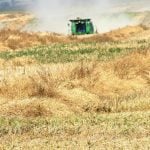Prairie farmers skeptical about soil health
Scientists and the federal government have been selling the concept of “soil health” for five to ten years, now but many Prairie farmers aren’t buying in according to research from the University of Calgary.
According to a survey of Canadian farmers, those from the Prairies are more apt than those from the east to be skeptical about soil health and soil health-boosting practices. Older farmers are more resistant to the concept than younger ones, and many farmer don’t understand what soil health really means.
Prairie farmers, particularly those from Saskatchewan and Alberta, may see the government emphasis on soil health as Ottawa telling them how to farm.
Jeff Schoenau is a soil scientist from the University of Saskatchewan. He suggested soil health is the same thing as soil quality—a term farmers may be used to. He said early in his career he studied the effects of no-till farming on soil quality,
and the parameters they examined—like soil organic content—were the same as those used today to describe soil health.
Ontario Corn Fed Beef celebrates 10 years’ partnership with Japanese buyer
A ten-year partnership between the Ontario Corn Fed Beef program and Japanese grocery chain Kinsho Stores could be a model for Canadian food companies looking to expand exports.
The two parties recently celebrated 10 years of partnership during a tour of Ontario beef farms.
Japanese grocery stores aren’t as concentrated as Canadian chains. This means smaller suppliers with defined brands and quality assurance can access those markets. Kinsho Stores chose Ontario Corn Fed Beef as a way to differentiate its beef products, said company president Hiroshi Ueda.
He said the taste and juiciness of Ontario beef is different from what most Japanese consumers expect. The beef program’s brand message includes quality assurance and connection to primary producers. This resonates with Japanese consumers, Ueda said.
The Japanese market is also valuable because it takes cuts that can be harder to move in the Canadian market, said John Baker, director of brand management for the program.
Hamburger steaks made from spiced ground beef are popular in Japan, and Ontario Corn Fed Beef is developing its own branded version.
Swath of Trump tariffs take effect across the globe
U.S. President Donald Trump’s higher tariffs took effect for dozens of countries on Thursday.
Countries like Brazil, Switzerland and India continued to look for a better deal as tariffs between 10 and 50 per cent took effect.
Brazil’s president, Luiz Inacia Lula da Silva, told Reuters he would not humiliate himself by seeking a phone call with Trump, though he said his government would continue to negotiate to lower the current 50 per cent levy.
Indian Prime Minister Narendra Modi was also defiant, saying he wouldn’t compromise the interests of India’s farms.
Late last week, Trump hiked tariffs on Canadian goods to 35 per cent. Dominic Leblanc is Canada’s minister responsible for relations with the U.S.He said on August first that Canada would keep negotiating, but that Canada wouldn’t accept a bad deal.
Most agricultural goods are exempt from tariffs under the CUSMA trade agreement.
The Canadian Cattle Association said it was glad to see ‘Team Canada’ focusing on the upcoming review
of the CUSMA trade agreement. It said the agreement has been vital to the integrated North American beef market.









